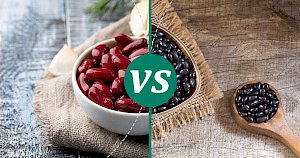Black Beans vs Kidney Beans: Nutrition, Calories & Protein Compared


Black beans vs Kidney beans
Nutrition Facts
Serving size:
change
5g10g15g20g30g40g50g60g80g100g120g140g160g180g200g220g250g300g350g400g450g500g600g700g800g900g1000g
1oz2oz3oz4oz5oz6oz7oz8oz10oz12oz15oz20oz25oz30oz35oz40oz50oz
Amount Per Serving:
Serving size:
change
5g10g15g20g30g40g50g60g80g100g120g140g160g180g200g220g250g300g350g400g450g500g600g700g800g900g1000g
1oz2oz3oz4oz5oz6oz7oz8oz10oz12oz15oz20oz25oz30oz35oz40oz50oz
Amount Per Serving:
Black Beans vs Kidney Beans 100g Compare
| per 100g | Black beans | Kidney beans |
|---|---|---|
| Calories | 341 | 333 |
| Carbohydrates | 62.36 g | 60.01 g |
| Fat | 1.42 g | 0.83 g |
| Dietary fiber | 15.5 g | 24.9 g |
| Protein | 21.6 g | 23.58 g |
| Water | 11.02 g | 11.75 g |
| Calcium | 123 mg | 143 mg |
| Iron | 5.02 mg | 8.2 mg |
| Magnessium | 171 mg | 140 mg |
| Potassium | 1483 mg | 1406 mg |
| Sodium | 5 mg | 24 mg |
| Vitaminium B1 (Thiamine) | 0.9 mg | 0.529 mg |
| Vitaminium B2 (riboflavin) | 0.193 mg | 0.219 mg |
| Vitaminium B3 (Niacin) | 1.955 mg | 2.06 mg |
| Vitaminium B6 | 0.286 mg | 0.397 mg |
| Vitaminium B9 (Folic acid) | 0.444 mg | 0.394 mg |
| Vitaminium E | 0.21 mg | 0.22 mg |
| Vitaminium K | 0.006 µg | 0.019 µg |
Discover the Nutritional Gems: Black Beans vs. Kidney Beans
When it comes to choosing between black beans and kidney beans, you're not just picking a side dish; you're selecting between two nutritional powerhouses with deep roots in culinary traditions around the globe. Both beans have not only been staples in various cuisines but also lauded for their health benefits. Let's delve into the world of these beans, comparing their nutritional content, health benefits, and culinary uses, to help you decide which bean might be the right choice for your next meal.
The Tale of Two Beans: An Overview
Black beans, also known as turtle beans, are prized for their dense and meaty texture, making them a favorite in Latin American, Caribbean, and Southwestern US cuisines. On the other hand, kidney beans, with their distinctive red color and slightly sweet taste, are a staple in Indian cuisine and a key ingredient in chili con carne.
While both beans share some nutritional similarities, they also have their unique differences. For instance, a cup of black beans contains 341 calories, 62.36g of carbohydrates, and 21.6g of protein. Kidney beans, in a similar serving, provide slightly less energy and carbs at 333 calories and 60.01g of carbohydrates but offer a bit more protein at 23.58g.
Fiber and Fat: The Nutritional Standouts
One of the most significant differences between these beans is their fiber content. Kidney beans lead with a remarkable 24.9g of fiber per cup, compared to the 15.5g found in black beans. This high fiber content supports digestive health and helps maintain blood sugar levels.
When it comes to fat, both beans are low in fat, but black beans have a slightly higher amount at 1.42g per cup, compared to kidney beans at 0.83g. Despite this difference, both beans are virtually free of saturated fats, making them a heart-healthy choice.
Minerals and Vitamins: A Closer Look
Both beans are excellent sources of essential minerals. Kidney beans have an edge in iron and calcium, offering 8.2mg and 143mg respectively, compared to black beans' 5.02mg of iron and 123mg of calcium. These minerals are crucial for maintaining healthy blood and bones.
However, black beans are not to be underestimated. They boast a higher content of magnesium, with 171mg per cup, which is essential for muscle and nerve function, compared to kidney beans' 140mg.
Culinary Uses: Beyond Nutrition
Beyond their nutritional benefits, both black and kidney beans offer versatility in the kitchen. Black beans are a staple in dishes like feijoada, black bean soup, and burritos. Their dense texture makes them ideal for vegetarian burgers and salads.
Kidney beans, with their robust structure, are perfect for slow-cooked dishes like rajma, chili, and stews. They hold their shape well, absorbing flavors from spices and other ingredients.
Conclusion: A Place for Both on Your Plate
In the end, choosing between black beans and kidney beans may come down to personal preference or specific dietary needs. Whether you're looking for a bean that packs more fiber, a slightly higher protein content, or one that fits perfectly into your favorite dishes, both black beans and kidney beans are nutritious choices that can enrich your diet. So why not include both in your meal rotation and reap the diverse benefits and flavors they offer?
Black beans 100g
341kcalCalories source
- 72% CARBS.
- 25% PROTEIN
- 4% FAT
Kidney beans 100g
333kcalCalories source
- 70% CARBS
- 28% PROTEIN
- 2% FAT
Compares of black beans
- Black Beans vs Fava Beans
- Black Beans vs Lima Beans
- Black Beans vs Lentil
- Black Beans vs Edamame
- Black Beans vs Pinto Beans
- Black Beans vs Garbanzo Beans
- see all compares of black beans
Compares of kidney bean
Read also:
- Calories from Black beans
- Calories of Black bread
- Calories in Fried egg white
- Roasted cashews calories per 100g
- Dried Goji berries protein per 100g
- How many calories does sweet potato mash have?
- Calories in a half of brown bread
- Calories in whole brown bread
- Calories for one, two or more brown bread
- Calories in slice of brown bread
- How much protein in chocolate ice cream?
Marcin Piotrowicz
calories-info.com creator
Healthy diet and healthy lifestyle promoter
Add comment